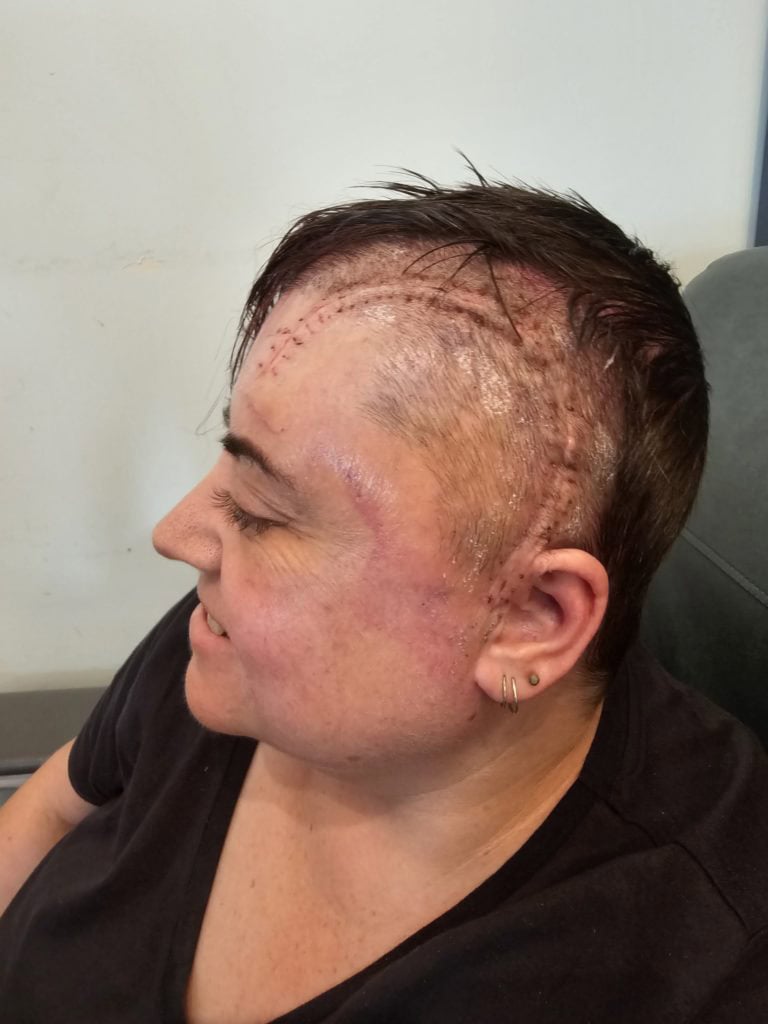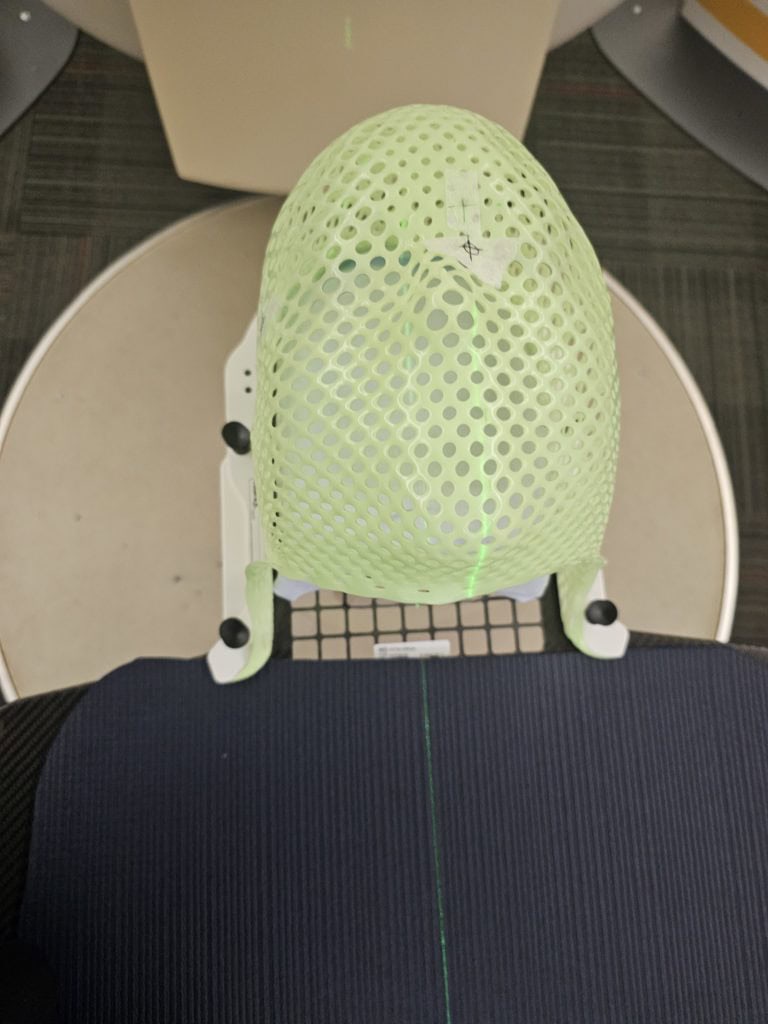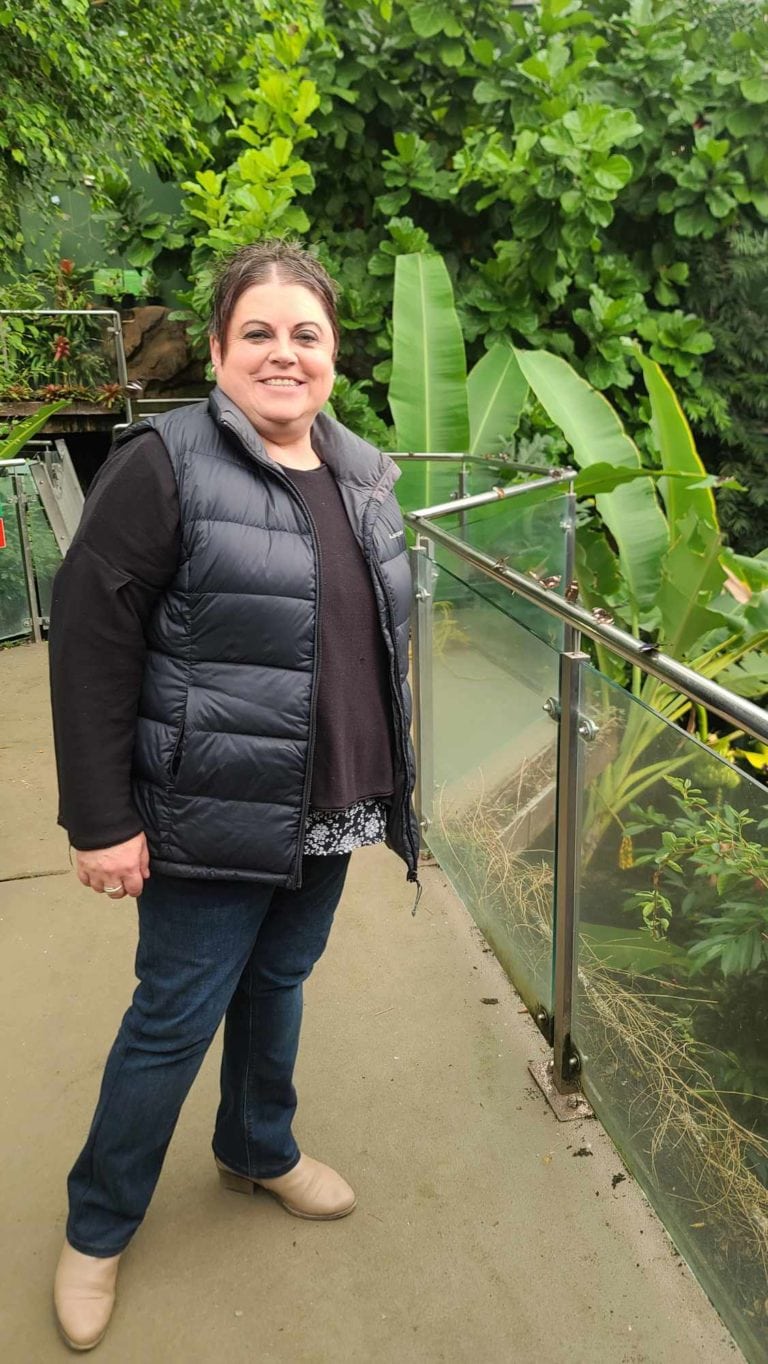What is Cavernous sinus meningiomas (Grade 2)?
Rare tumours that affect the cavernous sinus, an area that control eye movement and allows your face to feel sensations. Cavernous sinus meningiomas can cause double vision, dizziness and facial pain.
What is a craniotomy?
A surgical procedure that involves removing a piece of the skull to access the brain.
I was born in Gisborne, a small place with big skies and long summers. Life was simple in those early years - surrounded by family, close to the beach, and full of that childhood energy where anything felt possible.
When I was three, our family moved south to Invercargill, just before the 1984 floods. That move changed the course of our lives. Invercargill became home - the place I’d grow up, go to school, build friendships, and later return to after years away.
I went to St John Girls’ School and then Verdon College. After school, like many young women at the time, I went straight into work. My first job paid $5 an hour in retail. It wasn’t much, but I was proud.
Later, I studied for a national nanny certificate, and it opened doors I’d never imagined. I left New Zealand for nannying work overseas - first in Connecticut, then Kent in the UK.
I was in my early twenties, living in completely different cultures, caring for children, and growing in ways I couldn’t yet see.
I loved the adventure, but after two years, I started to miss home.
Back in New Zealand, I tried settling in Invercargill, but it felt too small after being abroad. My brother lived in Christchurch, so I packed up and moved there. He let me crash at his place until I found my feet. I got a job in retail again and took on cleaning work as well. I liked keeping busy, and Christchurch gave me that space to grow on my own terms.
Then came the earthquakes. Streets I used to walk had crumbled and buildings had collapsed.
Seeing the destruction was surreal. Familiar places were gone. The grief of a city in shock stays with you.
In the years that followed, I had surgery for gallstones, and for a while, life felt like it was settling. But then my dad’s health started to decline.
My parents had also been living in Christchurch, but with his dementia progressing, they decided to return to Winton to retire.
They asked me to come back to Invercargill with them, and I did. I wanted to be near them, to help where I could.
A few years later, my father passed away. We were incredibly close. His loss still sits heavily with me. I often wonder what he’d think about everything I’ve gone through lately. I know he’d want to protect me, even if he wouldn’t know how.
Now, my mum is still in Winton, and we look after each other. My brother, as always, remains a constant support. Family means everything to me. But back in those days, you didn’t really talk about health stuff, not like we do now. Illness was private, quiet. So when my own health journey began, I wasn’t sure how to talk about it either.
My health journey started in May last year.
I didn’t think much of going for my routine eye check-up. It was just something you did. But the examiner noticed something wasn’t quite right with my left eye. I was sent to the eye clinic at Southland Hospital for more tests.
The diagnosis: multiple cavernous sinus meningiomas. I was told I’d had them since birth, and it was only discovered because one had ruptured behind my eye. It had attached to the bone and was pushing through. My eye had been a little puffy, but I had no idea how serious it was.
Before this, I was generally healthy. I’d had headaches with facial numbness, tingling in my teeth, and vertigo, but I figured that was just “normal” for me.
I was sent to Christchurch for emergency surgery. It was a six-hour craniotomy where multiple tumours were removed in a procedure they called debulking.
A titanium mesh plate was inserted into my skull. I came out of surgery with 40 staples and a large shaved patch of hair. I thought that would be the end of it. But recovery was long and brutal. I spent two weeks in rehab in Dunedin learning how to walk, get dressed, and even make a cup of tea again. I had to relearn basic life skills.
I was weak, had no appetite, was always cold, and light hurt my eyes. It felt like I had become a child again.
That’s when I was introduced to the Ngā Kete Cancer Kaiārahi Service by a kaimahi at Southland Hospital. They have been my anchor. They help me get to appointments, and they’re always there when I need someone to talk to. I trust them completely.
They also introduced me to Manaaki Manawa, the Cancer Support Group, and that’s been life-changing. Since I couldn’t drive, the kaimahi would pick me up to go to group and it was the first time I’d ever been on a marae. Now I’ve learned so much about the culture, and I’ve made beautiful connections. I’ve never had this kind of support before. The group truly understands what I’m going through.
In February this year I began radiation treatment in Dunedin, Monday to Friday, for seven weeks. Just two days in, my left eye became swollen and blurry again and the radiation mask no longer fit. Doctors found brain swelling, and I was immediately put on steroids for the duration of treatment.
Radiation was incredibly tough. From day one, I was nauseous and tense. I needed a calming nasal spray before each session just to get through it. The side effects piled on quickly - mouth ulcers, oral thrush, pins and needles in my face, muscle spasms, and difficulty swallowing. I lost my appetite completely and dropped a lot of weight.
Now, I’m weaning off steroids, which has been another uphill battle. I still have brain swelling, trouble sleeping, and shortness of breath.
One of the hardest parts has been learning to ask for help. That’s something that doesn’t come naturally to me. I don’t like being treated differently because of my illness. I’m still me. This disease hasn’t changed who I am.
And yet, in the midst of all this, I’ve been reminded how deeply supported I am. Jo from Ngā Kete called regularly to check in. Members of Manaaki Manawa sent messages during my treatment. That connection meant everything during a time I felt isolated and vulnerable.
When I finally returned to the group, people told me they had missed me, and that meant the world to me.
We're now preparing for genetic testing to try to better understand the cause of my tumours. The tumour on the right side of my brain couldn’t be surgically removed, so radiation was our only option to try to stop it from growing. I’ve had an MRI since and it shows no change, nothing is growing. I’ll have another MRI in six months.
This journey has aged me in ways I can feel. But strangely, I also feel mentally clearer than ever. I’ve come through so much and I’m still here.
Some people still don’t believe I’m sick. Others don’t know how to talk about it. That’s hard. But I’ve learned there’s support out there. You just have to know where to look. I trust the Cancer Society and Ngā Kete completely.
I honestly never thought anyone would want to read my story. But maybe, just maybe, sharing it will help someone else feel less alone.
I’m determined to beat this. I know this disease could kill me but I won’t let those thoughts take root. And with all the support I’ve received, I know one thing for sure: No one is going to let me give up.



